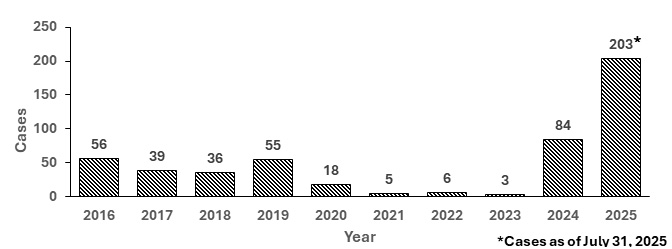Kauaʻi records the highest number of cases of whooping cough as of July
The Hawaiʻi Department of Health continues to respond to a rise in pertussis (whooping cough) cases statewide.

As of July 31, 2025, the department has identified 203 cases of pertussis — more than double the 84 cases identified in all of 2024.
Cases have been reported in every county, with the highest rates on Kauaʻi, Maui, and Hawaiʻi Island. Infants under 1 year old have been the most severely affected group, and there are elevated case rates among toddlers, children, and adolescents.
Pertussis is a highly contagious respiratory disease spread through the air via coughs or sneezes of an infected person. Initially, the symptoms resemble a cold but can progress to intense coughing fits.
In children, coughing fits can be followed by a deep breath that makes a “whooping” sound. Health complications can be serious and even life-threatening, especially for infants and young children who are not fully vaccinated. Complications include pneumonia, seizures, apnea (a pause in breathing), encephalopathy (a disease of the brain), and death.
The most effective way to reduce the risk and severity of pertussis is through vaccination with either the DTaP (diphtheria, tetanus and pertussis) or Tdap (tetanus, diphtheria and pertussis) vaccines. DTaP has been in use for more than 30 years, and the first dose is recommended at 2 months of age. Tdap has been available for nearly 20 years and is recommended for pregnant women, which helps protect their newborns, as well as for adolescents and adults.
“The high number of cases means there’s a greater risk of getting exposed to pertussis in the community. If you have not yet vaccinated your infant, please consider doing so to reduce the risk of hospitalization or even death,” said Dr. Kenneth Fink, director of the Department of Health. “Like with other vaccine-preventable diseases, we continue to strongly encourage all individuals to remain up to date on recommended vaccinations to help protect both the person vaccinated and those in our families and communities who are most vulnerable.”
To protect infants who cannot yet complete the full vaccine series, the Department of Health encourages a “cocooning strategy,” which involves ensuring close contacts of a baby, including parents, siblings, grandparents, child care staff, caregivers, and health care providers, are up to date on their pertussis vaccines. This provides a circle of protection around the infant until they are old enough to get all the doses of vaccine to be fully protected.
The Department of Health continues to work closely with families, health care providers, and schools to identify close contacts of cases, recommend testing and treatment when appropriate, and support public health measures to reduce the further spread of pertussis.
For more information about pertussis and how to protect yourself and your loved ones, visit the Department of Health website.



